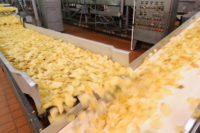An unfortunate roof collapse pushed Snak King to redesign and retool its plant. See how the West Coast manufacturer transformed this unfortunate event into an opportunity for growth in the future.

A roof collapse forced Snak King to redesign and rebuild its West Coast operation. Now, the company is celebrating its new look.
By Marina Mayer
Just last month, Snak King Corp. celebrated the four-year anniversary of its tragic roof collapse. It was a disaster that started when a 12,000-sq.-ft. chunk of roof destroyed three tortilla chip lines and brought production to a halt. The company’s line of signature products, including tortilla chips, pork rinds, cheese puffs, cheese curls, cheese popcorn, nuts and trail mixes, stopped as plant employees transformed from machine operators to clean-up artists and eventually to plant rebuilders.
It was a “royal disaster” that normally wouldn’t warrant a celebration by any other company some time later. But the folks of Snak King don’t operate like any other company.
After giving the plant a makeover and redesigning it for increased efficiency, they do, in fact, have something to celebrate.
Putting the pieces back together took three long years, beginning with the clean-up phase. In only a short few weeks, employees removed the roof remains, relocated the useable equipment into more accessible areas of the plant and began churning out products.
Next, says Mark Schieldge, vice president of operations, the company redesigned and reengineered the production operation over a two-year period while continuing to satisfy customers’ needs with a significantly reduced production capacity. However, the sales team’s opportunities to sell were limited. Snak King just couldn’t produce enough volume to solicit new business.
As a result, the snack manufacturer didn’t launch new products for a while as a result of capacity constraints, Schieldge says. Management couldn’t get into the plant to actually work on the plant trials.
“Now that we have the capacity,” he says, “we’re trying to approach new product development in a logical manner, get down there and work through the plant trials.”
Snak King now is focusing on new initiatives since the plant is up to speed with greater capacity and improved efficiency.
“Product development has always been a big focus for us,” says Barry Levin, chairman and CEO of the City of Industry, Calif.-based operation. “So one of the things we’ve done recently is to expand the marketing and R&D departments [to focus on new products].”
The kingdom was beginning to come together.
Full Speed Ahead
The company has restarted its new product efforts, thanks in part to the company’s new state-of-the-art lines that are housed inside the 177,000-sq.-ft. facility.
The tortilla chip lines, one of the casualties from the roof collapse, now are outfitted with PLC-controls where recipes are downloaded and automatically adjusted to set points. One of the lines pumps out 5,000 lb. of tortilla chips per hour while the second pumps out 2,800 lb. of chips per hour.
The other lines that are not fully PLC-controlled operate under strict process controls that require a line supervisor to manually complete control sheets against the specifications of the product, whether it is popcorn, pork rinds, nuts or extruded cheese snacks. Doing so enables the operation to maintain consistent product quality from shift to shift, Schieldge says.
“We utilize computer programs to capture the production output and compare that against our standard output so we can identify if we’re running at the proper efficiency or if we’re below,” he explains. “It’s the supervisor’s responsibility then to diagnose why [lines] are running below standard and address that in a corrective action.”
Meanwhile, the management team completes weekly plant inspections to ensure equipment is operating safely and efficiently.
Moreover, the maintenance department employs a computerized system to track the plant’s parts inventory, equipment breakdown history and work costs by line.
The company uses historic trends and upcoming promotional activity to forecast demand, order raw materials and put together the production plan, says Ron Jones, president and chief operating officer.
Additionally, the sanitation department operates under a
master schedule and uses standard operating practices, or SOPs, which identify
how each piece of equipment needs to be cleaned.
The sanitation team self-audits its work and then relies on a secondary audit completed by the quality team for verification. Third-party audits, many done by Snak King’s customers, verify that the company’s total quality systems are effective.
Each private label customer performs its own type of audit, resulting in a much tighter ship, Jones says, and because Snak King co-packs and manufactures private label products and snacks sold under its own brands, the operation has to be more demanding on quality and consistency.
From a production perspective, the plant follows strict processing procedures with regards to formulas and batch sheets.
The plant supervisor and equipment operators review the raw materials that will be used on each product run while the quality control team verifies the materials being used.
Confirming what’s being produced against what’s listed on the package runs in a similar fashion. The supervisor and quality control team compare the information on a package against the list of materials being used to ensure the line is producing exactly within the listed specifications.
The plant runs three, eight-hour shifts, five days a week. All products are made-to-order and ship within a week. Overall, about six lines run simultaneously. After five days of production, each line shuts down for two days of sanitation and maintenance.
“We don’t run every line every day,” Jones says. “We have more processing capability than we need on a daily basis.”
As a result, the company staggers production to allow operators to move from one line to another to produce additional products or to learn how to make different items.
Most of the lines operate under similar procedures. Bulk ingredients are piped in and incorporated in an automatic blender. All incoming ingredients contain disclaimers for allergen and organic materials, which is crucial for complying with U.S. Department of Agriculture organic certifications or to meet Kosher criteria for some products.
On a typical tortilla chip line, the ingredients travel through a series of rollers and sheeters, then through a roller cutter that creates the snacks’ shape before they’re fried at an average of 350°F. Then the product cools briefly before traveling through a seasoning tumbler.
The tortilla chips then head to automatic scaling and bagging in a form/fill/seal bag. At various stages throughout the entire process, product quality is constantly inspected. Finished goods are packed into master cases, sealed, palletized and stretch wrapped prior to loading for shipment.
The company relies on software to manage raw material, packaging and finished goods inventories. All raw materials and packaging are tracked using bar code “license plates.” At critical stages in the production process, each raw material’s “license plate” is scanned for up-to-the-minute inventory adjustments. This procedure fits nicely within Snak King’s overall just-in-time, produce-to-order system.
For security, all Snak King employees enter the building by swiping an employee identification card. The card’s six-digit identification number tracks when the employee enters and exits the building and clocks in and out for breaks to programmatically manage payroll.
Heading into the future, Jones says, the biggest emphasis will be on improvements to the plant on an incremental basis. That will be a sharp contrast to the massive overhaul that the company did over the past three years.
“Instead of gradually improving a manufacturing operation, we did it all at once,” he adds. “This has made for a substantially better operation than before the roof collapse.”
That’s something to celebrate, now that the hard work is all over.
Editor’s Note: To learn more about Snak King, head to www.snackandbakery.com to search for previous articles written about the company.


